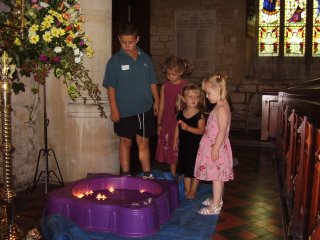I'll post it later,- when I'm sure its too late for of any of you to shriek in horror "But you can't preach that!"
We also have a special Open House: "All Creatures Great and Small: a pet blessing service for St Francis-tide" - which needs power point sorted, story finished, and all sorts of things still to be footled with.
What's more, I'm "on" again at that nearby church that is awaiting delivery of a new vicar, gift wrapped, any week now.
So one way and another, it's a bit of a killer really (still haven't looked at the material for Koinonia...but with any luck they'll have enough questions to keep me going anyway).
Still, it's not yet midnight and I do have 2 sermons finished, which is something to celebrate. What's more, Hugger Steward has just come in with an Indian takeaway. Definitely time to abandon the computer then.
Meanwhile, here's the 8.00 homily,- with thanks, once again, to Lawrence!
I wonder if anyone had the same sort of thoughts as I did on reading this morning’s Gospel.
Is it just me, or does John sound very much like a whiney, spoiled child telling tales?
“Teacher, we saw someone casting out demons in your name and we tried to stop him, because he wasn’t following us”
We’re the good boys. He ought to do it our way. He hasn’t got permission. He’s doing it all wrong. We’re on the right side of the line, - we know how to behave, how to do things properly, so nobody else can possibly be legitimate.”
That’s certainly how it reads to me ,- so what is really going on here? Are the disciples really being so smugly exclusive? What are they really objecting to?
The exorcist is using Jesus’ name to exorcise the demons (with apparently conspicuously more success than the disciples enjoyed!), but the disciples’ objection is not that he wasn’t a follower of Jesus, but of them!
“We tried to stop him because he wasn’t following US”
In other words, the disciples have taken upon themselves the role of “owning” Jesus, or policing his ministry. They think that they have the monopoly, so that for them “To follow Jesus is the same thing as belonging to our group. You can’t follow Jesus unless you do it our way! We make the rules!”
Does that sound in any way familiar, I wonder? I’m afraid it’s a story that we hear too often repeated in the church of today.
For so many people, there is no difference between discipleship of Jesus and church membership; between faith in Jesus and belonging to the institutional Church. We’re the insiders, we know what makes authentic Christian belief and we forget that if the church is a club at all, it should be one that exists to serve those who are not yet members…
So much for the church, and the disciples. In contrast, Jesus is having none of this.
He won’t allow the disciples to become gatekeepers, drawing confessional boundaries around him. His concern is not for “right theology” but “right practice”! The exorcist who is using Jesus’ name is good news for those whom he frees from possession, even though his ministry exists on the other side of the disciples’ imaginary line. …and it’s that liberating action that Jesus recognises and applauds.
“No one who does a deed of power in my name will be able soon afterwards to speak evil of me”.
But we’ve already heard that the disciples have struggled to perform deeds of power, and we know too that before too long they will desert the Lord to save their own skins.
They like the idea of owning Jesus, but are far less keen on the consequences of following him. His refusal to outlaw the “unlicensed” exorcist is a sign of the way things are for him…but the disciples see things rather differently. They want Jesus’ power, but not on Jesus’ terms. They want to be followed rather than to be followers, to be seen as the good guys, the insiders, the ones with the answers.
In contrast, Jesus won’t be limited to such a narrow view. “Whoever is not against us is for us”.
Elsewhere in the gospel tradition, Jesus says the opposite: “Whoever is not for us is against us”. In Mark’s context of persecution, not to strive actively on behalf of the oppressed Christian community is tantamount to joining in with the oppressors. Here, though, Jesus makes a different point. To act with compassion, to free the oppressed puts even an unknown exorcist on the side of the kingdom. That same compassion will be manifested in instinctive acts of caring and provision for the persecuted community: they will “give you a cup of cold water to drink because you bear the name of the Messiah”. To act compassionately to the disciples is the same thing as acting compassionately towards Jesus. It is to share in God’s character (compassion) and mission,- and praise God, those actions have never been limited to those within the boundaries of the church.



